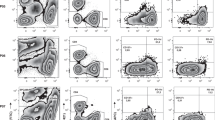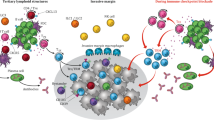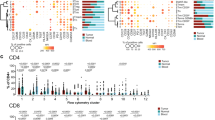Abstract
Background
Adoptive cell therapy using tumor-infiltrating lymphocytes (TILs) has shown promising results in cancer treatment, including breast cancer. However, clonal dynamics and clinical significance of TIL expansion ex vivo remain poorly understood.
Methods
We investigated T cell receptor (TCR) repertoire changes in expanded TILs from 19 patients with breast cancer. We compared TCR repertoire of TILs at different stages of expansion, including initial (2W TILs) and rapid expansion (REP TILs), and their overlap with formalin fixed paraffin embedded (FFPE) and peripheral blood. Additionally, we examined differences in TCR repertoire between CD4+ and CD8+ REP TILs.
Results
In descending order of proportion, average of 60% of the top 10% clonotypes of FFPE was retained in 2W TIL (60% in TRB, 64.7% in TRA). Among the overlapped clonotypes between 2W TILs and REP TILs, 69.9% was placed in top 30% of 2W TIL. The proportion of clonotypes in 2W TIL and REP TIL showed a significant positive correlation. CD4+ and CD8+ T cells show similar results in diversity and CDR3 length.
Conclusions
Our study traces the changes in TILs repertoire from FFPE to 2W TIL and REP TIL and confirmed that clonotypes with high frequencies in TILs have a high likelihood of maintaining their priority throughout culture process.
This is a preview of subscription content, access via your institution
Access options
Subscribe to this journal
Receive 24 print issues and online access
$259.00 per year
only $10.79 per issue
Buy this article
- Purchase on Springer Link
- Instant access to full article PDF
Prices may be subject to local taxes which are calculated during checkout





Similar content being viewed by others
Data availability
Data are available on reasonable request.
References
Restifo NP, Dudley ME, Rosenberg SA. Adoptive immunotherapy for cancer: harnessing the T cell response. Nat Rev Immunol. 2012;12(4):269–81.
Diaz-Cano I, Paz-Ares L, Otano I. Adoptive tumor infiltrating lymphocyte transfer as personalized immunotherapy. Int Rev Cell Mol Biol. 2022;370:163–92.
Scheper W, Kelderman S, Fanchi LF, Linnemann C, Bendle G, de Rooij MAJ, et al. Low and variable tumor reactivity of the intratumoral TCR repertoire in human cancers. Nat Med. 2019;25(1):89–94.
Lee HJ, Kim YA, Sim CK, Heo SH, Song IH, Park HS, et al. Expansion of tumor-infiltrating lymphocytes and their potential for application as adoptive cell transfer therapy in human breast cancer. Oncotarget. 2017;8(69):113345–59.
Zhang C, Ding H, Huang H, Palashati H, Miao Y, Xiong H, et al. TCR repertoire intratumor heterogeneity of CD4(+) and CD8(+) T cells in centers and margins of localized lung adenocarcinomas. Int J Cancer. 2019;144(4):818–27.
Hendry S, Salgado R, Gevaert T, Russell PA, John T, Thapa B, et al. Assessing tumor-infiltrating lymphocytes in solid tumors: a practical review for pathologists and proposal for a standardized method from the international immunooncology biomarkers working group: part 1: assessing the host immune response, TILs in invasive breast carcinoma and ductal carcinoma in situ, metastatic tumor deposits and areas for further research. Adv Anat Pathol. 2017;24(5):235–51.
Poncette L, Bluhm J, Blankenstein T. The role of CD4 T cells in rejection of solid tumors. Curr Opin Immunol. 2022;74:18–24.
Park IA, Rajaei H, Kim YA, Lee H, Lee H, Seo JH, et al. T cell receptor repertoires of ex vivo-expanded tumor-infiltrating lymphocytes from breast cancer patients. Immunol Res. 2020;68(5):233–45.
Bolotin DA, Poslavsky S, Mitrophanov I, Shugay M, Mamedov IZ, Putintseva EV, et al. MiXCR: software for comprehensive adaptive immunity profiling. Nat methods. 2015;12(5):380–1.
Bagaev DV, Vroomans RMA, Samir J, Stervbo U, Rius C, Dolton G, et al. VDJdb in 2019: database extension, new analysis infrastructure and a T-cell receptor motif compendium. Nucleic Acids Res. 2019;48(D1):D1057–62.
Tickotsky N, Sagiv T, Prilusky J, Shifrut E, Friedman N. McPAS-TCR: a manually curated catalogue of pathology-associated T cell receptor sequences. Bioinformatics. 2017;33(18):2924–9.
Vita R, Mahajan S, Overton JA, Dhanda SK, Martini S, Cantrell JR, et al. The immune epitope database (IEDB): 2018 update. Nucleic Acids Res. 2019;47(D1):D339–d43.
Chen SY, Yue T, Lei Q, Guo AY. TCRdb: a comprehensive database for T-cell receptor sequences with powerful search function. Nucleic Acids Res. 2021;49(D1):D468–d74.
Pasetto A, Gros A, Robbins PF, Deniger DC, Prickett TD, Matus-Nicodemos R, et al. Tumor- and neoantigen-reactive T-cell receptors can be identified based on their frequency in fresh tumor. Cancer Immunol Res. 2016;4(9):734–43.
John J, Chen SMY, Woolaver RA, Ge H, Vashisht M, Huang Z, et al. Host-specific differences in top-expanded TCR clonotypes correlate with divergent outcomes of anti-PD-L1 treatment in responders versus non-responders. Front Immunol. 2023;14:1100520.
Labarrière N, Gervois N, Bonnin A, Bouquié R, Jotereau F, Lang F. PBMC are as good a source of tumor-reactive T lymphocytes as TIL after selection by Melan-A/A2 multimer immunomagnetic sorting. Cancer Immunol Immunother. 2008;57(2):185–95.
Al-Kadhimi Z, Callahan M, Fehniger T, Cole KE, Vose J, Hinrichs S.Enrichment of innate immune cells from PBMC followed by triple cytokine activation for adoptive immunotherapy.Int Immunopharmacol.2022;113:109387.
Ghaffari S, Torabi-Rahvar M, Aghayan S, Jabbarpour Z, Moradzadeh K, Omidkhoda A, et al. Optimizing interleukin-2 concentration, seeding density and bead-to-cell ratio of T-cell expansion for adoptive immunotherapy. BMC Immunol. 2021;22(1):43.
Ahrends T, Busselaar J, Severson TM, Bąbała N, de Vries E, Bovens A, et al. CD4(+) T cell help creates memory CD8(+) T cells with innate and help-independent recall capacities. Nat Commun. 2019;10(1):5531.
Ahrends T, Spanjaard A, Pilzecker B, Bąbała N, Bovens A, Xiao Y, et al. CD4(+) T cell help confers a cytotoxic T cell effector program including coinhibitory receptor downregulation and increased tissue invasiveness. Immunity. 2017;47(5):848–61.e5.
John J, Woolaver RA, Popolizio V, Chen SMY, Ge H, Krinsky AL, et al. Divergent outcomes of anti-PD-L1 treatment coupled with host-intrinsic differences in TCR repertoire and distinct T cell activation states in responding versus non-responding tumors. Front Immunol. 2022;13:992630.
Funding
This study was supported by the Asan Institute for Life Sciences, Asan Medical Center, Seoul, Republic of Korea (2018IL0169).
Author information
Authors and Affiliations
Contributions
HJL and GG designed the study. BH, SYK, YAK, HJL, and JS developed the methodology. Experiments were performed by BH and YAK. Data were analyzed by BH, SYK, and JS. BH, SYK, YAK, HJL, and JS wrote the manuscript with input from all coauthors. DYH, TP, SC, SWJ, JHK, GP, and GG edited the manuscript.
Corresponding authors
Ethics declarations
Competing interests
HJL is the CEO and owns stocks in NeogenTC Corp.
Ethics approval and consent to participate
This study was approved by the institutional review board of Asan Medical Center (approval no. 2016-0935), and written informed consent was obtained from the patients.
Additional information
Publisher’s note Springer Nature remains neutral with regard to jurisdictional claims in published maps and institutional affiliations.
Supplementary information
Rights and permissions
Springer Nature or its licensor (e.g. a society or other partner) holds exclusive rights to this article under a publishing agreement with the author(s) or other rightsholder(s); author self-archiving of the accepted manuscript version of this article is solely governed by the terms of such publishing agreement and applicable law.
About this article
Cite this article
Ham, B., Kim, S.Y., Kim, YA. et al. Persistence and enrichment of dominant T cell clonotypes in expanded tumor-infiltrating lymphocytes of breast cancer. Br J Cancer (2024). https://doi.org/10.1038/s41416-024-02707-6
Received:
Revised:
Accepted:
Published:
DOI: https://doi.org/10.1038/s41416-024-02707-6



